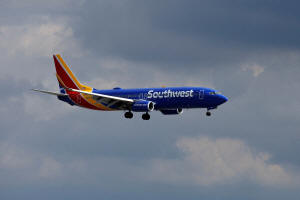Flight attendants in North America push for landmark changes in new
contracts
 Send a link to a friend
Send a link to a friend
 [December 21, 2023] By
Rajesh Kumar Singh and Allison Lampert [December 21, 2023] By
Rajesh Kumar Singh and Allison Lampert
CHICAGO/MONTREAL (Reuters) - The compensation system for flight
attendants in the U.S. and Canada is under attack in new contract
negotiations that could lead to big pay raises for cabin crews, but
higher costs for airlines.
Thousands of cabin crews at carriers in both countries are demanding to
be paid for more of their hours at work - a fundamental change from how
the industry currently compensates them by paying largely when the
aircraft is in motion.
As U.S. and Canadian carriers negotiate labor contracts, flight
attendants are piling pressure on their unions to end the practice of
"free work," such as when boarding passengers and waiting around the
airport in between flights.
A tentative contract agreement presented this week to cabin crews at
Canadian leisure carrier Transat AT, for example, is offering pay
provisions for tasks that are currently unpaid, according to a person
familiar with the matter.
Melius Research estimates that offering boarding pay alone will inflate
the annual wage bill at U.S. airlines by more than $700 million.
Holding the line on costs, however, runs the risk of fueling staff
resentment and turnover that could cause travel turmoil.

Flight attendants at Southwest Airlines rejected a contract deal this
month that lacked boarding pay, but would have made them the
highest-paid cabin crews in the industry. The carrier reached a $12
billion deal with its pilots on Tuesday.
"We are cleaning up diapers and we are cleaning up vomit without being
paid," said one Southwest flight attendant who requested anonymity for
fear of reprisal. She said she recently voted against the company's
contract offer. "It's time to change the antiquated industry."
Delta Air Lines last year started paying its flight attendants at half
of their hourly wages amid efforts to unionize them, setting a benchmark
for other carriers.
United Airlines flight attendants, who demonstrated nationwide last
week, have demanded pay for their time during boarding and on the
ground, its union head, Ken Diaz, told Reuters.
Their counterparts at Alaska Air are seeking similar concessions and
have decided to hold a strike authorization vote early next year for the
first time in two decades.
PUSHBACK
Against this backdrop of flight-attendant discontent, airlines are
pushing back, unions say.

[to top of second column] |

A Southwest Airlines commercial aircraft approaches to land at John
Wayne Airport in Santa Ana, California U.S. January 18, 2022.
REUTERS/Mike Blake/File Photo

United has rejected proposals to pay flight cabin crew for all duty
hours, and has instead proposed longer work hours, Diaz said.
American Airlines is open to boarding pay only under certain
conditions, its flight attendant union head said.
United and American said they want "industry-leading" deals for
their flight attendants. American's spokesperson said the company's
proposal includes boarding pay and will translate into salaries of
$80,000 a year for flight attendants who work an average of 71 hours
a month - up 20% from what they earn at present. The company's union
has asked for a 50% increase in wages over four years.
Alaska Air said it remains open to alternative pay structures
proposed by the union. Transat declined to comment ahead of a vote
by cabin crew.
Union officials say flight attendants have endured a lot since the
pandemic - having to deal with unruly passengers and enforce the
politically controversial mask mandate on planes, but their wages
have remained stagnant.
They have also been encouraged by hefty pay raises and improvements
in working conditions for pilots, as well as other more generous
deals reached in other industries.
The Canadian Union of Public Employees, which represents 18,500
flight attendants, plans to ask a labor board next year to decide
for the first time whether the unpaid work violates the country's
labor code. It estimates its members on average work 35 hours a
month without pay.

Similarly, in the United States, Dominique Tuggle, 32, a flight
attendant at American, cited a recent trip when she worked almost 12
hours, but was paid for only about 7 hours.
Tuggle, who lives in Dallas, said stagnant wages and lack of pay for
a large portion of her workday have forced her to dabble in the
stock market in order to make ends meet.
"The contract is the only means to rectify it," Tuggle said. "It is
now or never."
(Reporting by Rajesh Kumar Singh in Chicago and Allison Lampert in
Montreal; Additional reporting by Carlos Barria in San Francisco;
Editing by Ben Klayman and Matthew Lewis)
[© 2023 Thomson Reuters. All rights
reserved.]
This material may not be published,
broadcast, rewritten or redistributed.
Thompson Reuters is solely responsible for this content. |